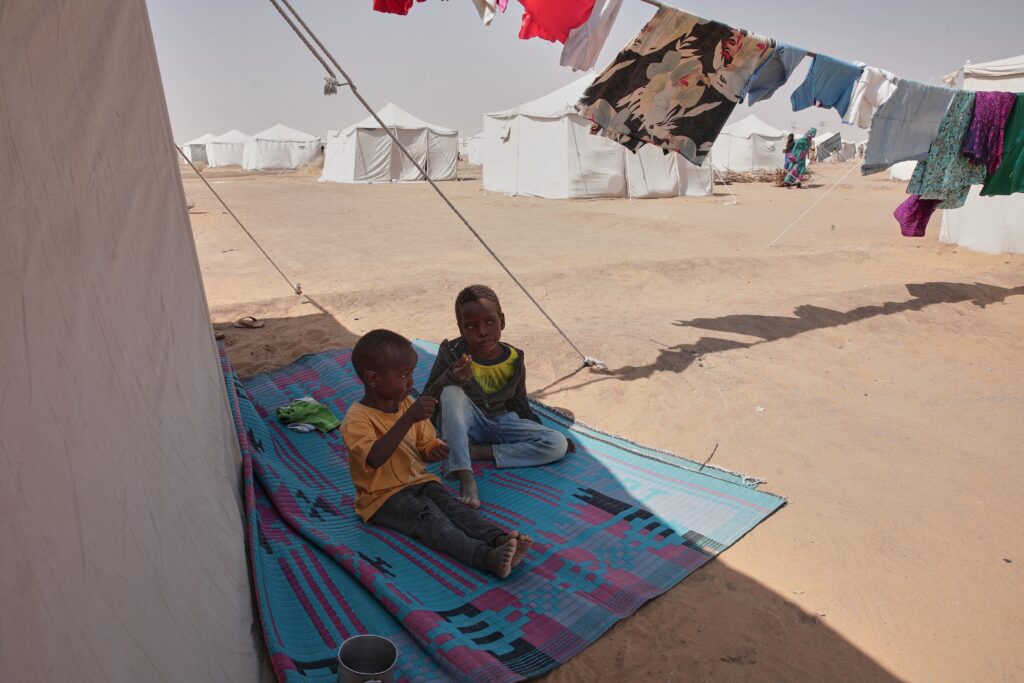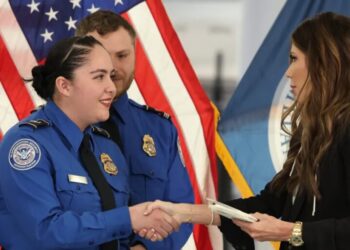The children stumble in from a burned desert of the dying and the dead. They are weak from hunger and filled with horror. And they are alone.
Aid workers say hundreds of unaccompanied children have arrived in the Sudanese town of Tewila in recent weeks after escaping El Fashir, where fighters from the Rapid Support Forces paramilitary (RSF) have carried out mass killings and kidnappings after seizing the city last month. Some children saw their parents killed; others lost them in the chaos of fleeing. There are babies too, some just weeks old, found clinging to the bodies of their parents and brought to the displacement camp by strangers, according to humanitarian groups in Tewila.
The children stumble in from a burned desert of the dying and the dead. They are weak from hunger and filled with horror. And they are alone.
Aid workers say hundreds of unaccompanied children have arrived in the Sudanese town of Tewila in recent weeks after escaping El Fashir, where fighters from the Rapid Support Forces paramilitary (RSF) have carried out mass killings and kidnappings after seizing the city last month. Some children saw their parents killed; others lost them in the chaos of fleeing. There are babies too, some just weeks old, found clinging to the bodies of their parents and brought to the displacement camp by strangers, according to humanitarian groups in Tewila.
Sudan’s civil war, pitting the RSF against the country’s armed forces, has given rise to a historic humanitarian crisis. U.S. officials estimated last year that 150,000 people had been killed, and the bloodletting has only intensified. Twelve million have been displaced.
The RSF besieged El Fashir for a year and a half — part of a larger campaign to bring the western Darfur region under its control — walling off the starving city to create what researchers described as a “kill box.” When the army abandoned its last positions in late October, more than a quarter million defenseless people were trapped inside, the United Nations estimated, with many more in surrounding villages.
Fewer than 90,000 have escaped, the International Organization for Migration said Wednesday. A communications blackout in the city makes it impossible to determine how many of the remaining civilians have been killed. But there are horrifying clues: RSF fighters have posted videos of their atrocities, survivors have spoken of widespread massacres and the Humanitarian Research Lab at the Yale School of Public Health has analyzed satellite imagery to approximate the scale of the slaughter. One report last week detailed earth disturbances consistent with mass graves; another documented what appeared to be the removal and burning of bodies.
Both sides in the conflict have been accused of war crimes on a massive scale.
But the past two weeks represent “the single largest incident of mass killing since the war began in 2023,” said Nathaniel Raymond, the head of the Yale research lab.
The Washington Post spoke to three children by phone in the presence of aid workers about their harrowing 40-mile journey from El Fashir to Tewila and the things they saw along the way. They talked about trying to protect and comfort younger siblings, and the pain of being separated from mothers and fathers, brothers and sisters. The Post could not independently confirm their accounts, but they aligned with numerous other testimonies from survivors, as well as reports from local and international aid groups in Tewila, the last place of refuge in this desolated region.
It is unclear how families will be made whole again.
Reunifications require painstaking work, humanitarian groups say, and must center the best interests of the children involved.
HOPE Sudan said it has registered around 200 unaccompanied children since the fall of El Fashir. Many more fled to Tewila after RSF fighters overran the nearby Zamzam refugee camp in April. The National Society for Child Protection, another Sudanese charity, said it had documented 1,000 children who have no immediate family with them in Tewila; 700 had no relatives at all. Some were as young as 3 months.
“We placed some of them with foster families, and others with community leaders,” said an aid worker, speaking like others in this story on the condition of anonymity for fear of RSF reprisals. “There are children with gunshot wounds receiving treatment … there are girls who were raped.”
“Some are so traumatized,” another aid worker said, they “don’t remember what happened to them.”
“When the fighting began in El Fashir, we all ran out of the house,” a 13-year-old girl told The Post across a crackly phone line. She immediately lost sight of her mother, her little sister and four of her brothers, she said. The baby of the family, just 6 months old, was strapped to her back.
She carried him all the way to Tewila, she said.
“My brother was crying a lot but I was only able to give him water twice,” she said. She described walking at night to avoid fighters and trying to find shade among scorched desert bushes during the punishingly hot days. Eventually, she said, her brother stopped crying and lay limply against her.
“We saw so many dead bodies on the road and wounded people calling for help,” the girl said, her voice crumpling. “On all this road I don’t know where my mother is,” she said. “Death was everywhere.”
Her brother was given milk and high energy supplements at the hospital in Tewila, but the girl said she “can’t eat anything” until she hears news of her mother and siblings. As she spoke, her baby brother wailed in the background.
A pediatrician at the hospital, Giulia Chiopris from Doctors Without Borders, said the youngest unaccompanied child she had seen was just 40 days old, and arrived with two toddler siblings.
A 15-year-old boy said he had already been orphaned and wounded by the time El Fashir fell. His father was killed by a shell in April, throwing the family into mourning.
“My father was keen to spend every evening with us,” he said. “He always advised us to be honest.”
Two weeks later, shrapnel from another shell pierced his mother’s chest.
She said “‘be kind to each other and don’t scold your sister,’” the boy recounted, “and she died.” Days before the RSF takeover, his leg was injured by a shell blast that killed nine people, he said, including his best friend Muhammad, who bled to death next to him.
“Muhammad was my truest friend after my mother,” he said. “He was always by my side, even at school. We worked together and never separated. Even the jacket and pants I wear now are his.”
When food ran out and fighting worsened, he said, he decided to flee El Fashir with his 14-year old sister and younger brother. An older brother, fearing he would be killed on the road, decided to stay behind. His sister had become like a mother to him, the boy said, standing by his side in the hospital and refusing to eat until he had eaten. They left the day before the city fell; he strapped a ruler to his injured leg and hobbled along with the help of a stick.
Seeing his injury, an RSF fighter unexpectedly offered him a ride toward Tewila, but it meant parting from his siblings. And the car soon dropped him, alone, in the middle of the desert, he said. He limped the rest of the way.
He said he “deeply regretted” leaving his brother and sister behind: “I would have preferred to die with them.” This week, however, a stranger told him they are both still alive, in an area north of Tewila. He doesn’t know how — or when — they might find their way back to each other.
A girl, aged 15, said her mother was killed by an exploding shell as RSF forces stormed El Fashir. She fled the city with her father and three brothers; in the melee, she and her 10-year-old brother were separated from the rest of the family.
RSF forces robbed her of her mother’s old phone, which she had been carrying. It was the only way for her father to contact her. She and her younger brother walked to Tewila by themselves. They saw so many bodies, she said.
“I saw a man who was about to die, but we didn’t stop to help him,” she said sadly.
“We continue to see families torn apart, children arriving alone,” said Nic Pyatt, the Africa director for Nonviolent Peaceforce, an international organization that works to protect civilians in conflict zones. “Every day, we face new stories of sexual assault, extortion, kidnap for ransom, harassment, wounds,” Pyatt said.
Haruna Tarfa is a doctor with the Alliance for International Medical Action (ALIMA), a medical charity working in Tewila. He said five unaccompanied children arrived at their health facility on a single day this week. They were exhausted and malnourished, and some had serious injuries.
He treated a 16-year-old girl who arrived with her aunt, having survived a blast that killed her parents and three siblings and blew off part of her arm. “At least,” Tarfa said, “we can save their lives.”
Some Sudanese have posted videos of lost children online, hoping a relative will see them.
“I found this child alone on the day El Fasher fell. He said he lives in Al Wahda neighborhood and doesn’t know his father’s name, only his mother’s,” said a man in a Facebook post, his hands on the shoulders of a young boy with a bandaged leg.
“If his mother appears, she should come to us in Al Shuhada neighborhood,” the man continued. “The child is with me at home.”
The post Sudan’s lost children wander through a landscape of death
appeared first on Washington Post.




